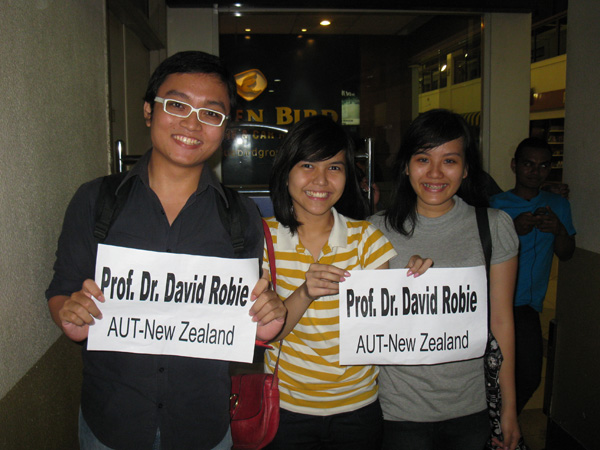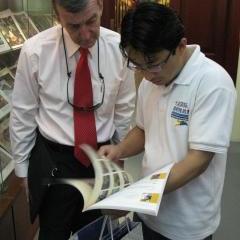
New Zealand journalism schools need to be far more internationally minded and think outside the parochial square, says Pacific Media Centre director David Robie.
Just back from a six-week sabbatical trip to several Asian countries and Europe, Dr Robie says many New Zealand journalism graduates are doing well in countries such as China while pursuing an international career.
The PMC at AUT University has promoted a postgraduate internship programme with support from the Asia New Zealand Foundation for the past seven years and several graduates have used this as a springboard for a global career.
“New Zealand’s future lies in the Asia-Pacific region with an emphasis on Asia, especially China, our second largest trading partner,” he says. “Journalism courses here need to reflect that.
“Long gone are the days when journalism graduates saw the New Zealand media as their sole job market.”
AUT’s School of Communication Studies launched New Zealand’s first Asia-Pacific or international journalism paper in 2007 and Associate Professor Robie teaches the course. During his sabbatical trip, Dr Robie visited the Communications University of China with AUT’s international relations director Chris Hawley; China Daily, the major state-run English newspaper and website where AUT graduates go on regular internships as foreign “experts” for copy polishing; a leading Hongkong university-based journalism school; Asian Media Information and Communication Centre (AMIC) in Singapore; Airlangga University’s communications school and the Jawa Pos news media network headquarters in Surabaya, Indonesia; Reporters San Frontières media freedom group in Paris; and the International Herald Tribune’s Asian bureau in Hongkong among other media and educational centres.
During his sabbatical trip, Dr Robie visited the Communications University of China with AUT’s international relations director Chris Hawley; China Daily, the major state-run English newspaper and website where AUT graduates go on regular internships as foreign “experts” for copy polishing; a leading Hongkong university-based journalism school; Asian Media Information and Communication Centre (AMIC) in Singapore; Airlangga University’s communications school and the Jawa Pos news media network headquarters in Surabaya, Indonesia; Reporters San Frontières media freedom group in Paris; and the International Herald Tribune’s Asian bureau in Hongkong among other media and educational centres.
Internship strategy
In Beijing, he had discussions with the China Daily management about a strategy to boost AUT’s exchange scheme and improvements for the internship scheme.
He also met current intern Michele Ong and a former intern, Guanny Liu, who now works with a Beijing-based international radio station.
“The internship changed my life,” said Liu, who had been working for Radio New Zealand and worked on a China Daily internship after graduation before landing the Beijing job.
Both Ong and Liu speak Mandarin. Ong has just returned from a Shanghai Expo assignment and a travel reporting mission in Anhui province. In Surabaya, Dr Robie gave a lecture to Airlangga media students about Asia-Pacific press freedom and comparisons between micro-island states and the Indonesian news industry environment.
In Surabaya, Dr Robie gave a lecture to Airlangga media students about Asia-Pacific press freedom and comparisons between micro-island states and the Indonesian news industry environment.
Airlangaa postgraduate students have studied at AUT and a closer relationship between the two universities is being developed.
In Paris, Dr Robie met with Reporters Sans Frontières Asia-Pacific researcher Vincent Brossel and discussed plans for stronger South Pacific collaboration with the Pacific Media Centre, which operates the regional media monitoring project Pacific Media Watch and the news website Pacific Scoop.



